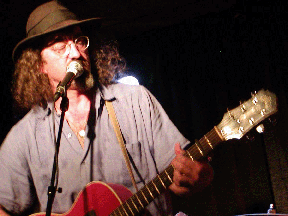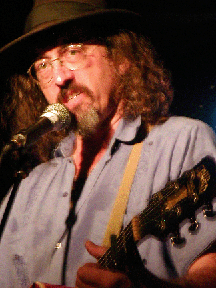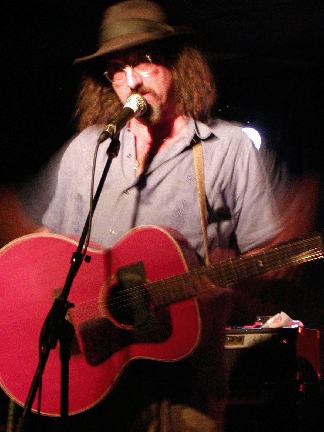James McMurtry
Letters from the Heartland
by Richard Cuccaro
Photo: Richard Cuccaro
At around nine o'clock on a Tuesday at Maxwell's in Hoboken in early June,
James McMurtry had just finished his first number, "Bayou Tortous," from
the new album, Just Us Kids. James and his 3-piece band, The Heartless Bastards had smoked its way through its four-plus minutes. Most of the crowd hung toward the back of the small, chairless concert space, leaving the smooth, hardwood dance floor unused.
The final chord drifted off and he spoke into the microphone: "Public service
announcement: The section in front of the stage is not a security zone, It's for
dancin.' Don't be afraid to come up close. Probably sounds better back there,
but if you're interested in examining the species… don't be bashful…"
James's blunt manner makes some people wary. His eyes peer out defiantly
as if to say, "What dumb shit are you gonna try and run by me now?"
His face registers a look that suggests a bullshit meter that has gone off the
upper end of the dial a few times too many. It occured to me that he might
harbor an impatience with the idea that we hold performers to a high standard
on stage, then later on we expect them to be just like us. Well, they're not.
The life they lead takes them places most of us will never see. Just a theory.
There's a see-saw dynamic between the eloquence of his lyrics and the raucous nature of his musical style. However, McMurtry prefers to boogie and he likes it when his audience comes to do the same. When he and the band crank out an anti-corporate diatribe in rapid 4/4 time, he doesn't want to see anyone standing around as if they're taking notes. He wants to see some butts shaking.
He can't help it that he's extremely literate and that his lyrics about people and
life in the heartland of a fast-sinking culture encourage close scrutiny. He also
can't help it that his father is Larry McMurtry, author of Lonesome Dove and
Terms of Endearment. People tend to lean on the connection and treat James like a college professor, albeit one with an electric (and sometimes acoustic) guitar.
He hates that. If you decide to see a live show, it's a good idea not to get too
locked into the literary mindset. That said, there is a terse, biting, sarcastic wit
mixed in with the whipsaw roadhouse blues guitar licks. So, you could say,
there is some validity to the notion that, when you come to see James play,
you're encountering something like Mark Twain with a Telecaster.
The crowd moved closer, and by the concert's end, two hours later, the entire
space was pretty much filled. While hoarse cries of approval greeted the last
notes of many of the hard-driving numbers, there wasn't too much dancing
going on. Maxwell's does not equate to midnight on Wednesday at the Continental Club in Austin, Texas. That's where James and the Heartless Bastards perform every week when he's not on tour.
At the concert's end, after he finished signing CDs, I followed James downstairs to a "green room" below the bar. There was graffiti on the walls and a bargain fabric hung on a rod strung across its entrance. Not classy, but it worked. We sat on a bench and had a brief chat about the state of affairs in the U.S. of A. and what drives his musical expressions of discontent. I confined our talk to current matters, because the usual biographical material I usually ask about is pretty much covered online. What I learned online about his history follows below.
James was born in 1962 in Fort Worth, Texas. The family later moved to Leesburg, Virginia. They stayed for about 10 years, but they always considered themselves Texans. His father gave him his first guitar at age seven and his mother taught him how to play it. "My mother taught me three chords and the rest I just stole as I went along. I learned everything by ear or by watching people," he has said. They'd gone to see a Kris Kristopherson concert and Kris looked to be having a blast, so James figured that was what he wanted to do with his life.
He began performing in his teens, writing bits and pieces, then started performing his own songs at a downtown beer garden while studying English and Spanish at the University of Arizona in Tucson. After traveling to Alaska and playing a few gigs, James returned to Texas and his father's "little bitty ranch house crammed with 10,000 books." After a time, he left for San Antonio, where he worked as a house painter, actor, bartender, and sometimes singer, performing at writers nights and open mics. In San Antonio, a friend persuaded him to enter the new folk competition at the annual folk festival in Kerrville, Texas, a songwriter's mecca. He was one of the six winners that year and it gave him the encouragement to forge ahead.
When John Mellencamp starred in a film based on a script by James's father, Larry, it gave James the opportunity to get a demo tape to Mellencamp. Mellencamp subsequently served as co-producer on McMurtry's 1989 debut album, Too Long in the Wasteland.
McMurtry released follow-up albums, Candyland (1992), Where'd You Hide the Body (1995), Walk Between the Raindrops (1998) and St. Mary of the Woods (2002). A tour album called Live In Aught-Three followed in 2004 .
In 2005, McMurtry released Childish Things where things got political. It featured the working-class anthem "We Can't Make It Here." The song contains direct criticism of George W. Bush, the Iraq War, and the increasingly desperate plight of the American worker. The political content got even hotter with this year's Just Us Kids, which included the bluntly direct, "Cheney's Toy."
The political stuff made me respect him even more. In one interview, he stated, "I was always afraid of it. I was afraid it would screw up my art and I would wind up writing sermons instead of songs." He changed his mind because, as he said, "The situation is too dire. I had to do something." It may have been the political stuff that prompted bestselling author and part time musician (and more importantly, radio station owner) Stephen King, in his column for Entertainment Weekly, to call James McMurtry "the truest, fiercest songwriter of his generation."
James's track record stood on is own before the political stuff. He was already one of my favorites from my initial acquaintance with 1995's Where'd You Hide the Body. "Rachel's Song," "Down Along the Delaware," "Levelland" and the title track were already seared into my gray matter.
Where'd You Hide the Body is still my favorite McMurtry CD. I believe "Rachel's Song" is one of the primary reasons James gets the literary treatment. Its story of a single mother with a drinking problem blew my doors off in 1995 and the lyrics show why:
Must be a cold front coming / Cause I saw the eastbound C&O
And the coal cars were dusted with a half inch of snow
And that boy'll drive me crazy / Don't know what I'll do with him
School will be out tomorrow if that cold front moves in
Calling out / To the dying daylight
The shadows of the mountains / Bringing on the night
When I'm all alone it's all right / It Isn't going to wound my pride
If anyone can claim they're all right / So can I
I wrecked the El Camino / Would have been DWI
So I just walked off and left it / Laying on its side
The troopers found it in the morning /
And they said it's purely luck I wasn't killed
I probably ought to quit my drinking / But I don't believe I will
Her loneliness is evident in the closing lines, as the snow closes in and she realizes she'll be stuck alone with her unruly son (and her addiction) the following day.
Calling out to the empty night / Watching as the snowflakes
Come dancing 'round the light / Dancing up against the window
It's like they're peeking through the glass
And they hover for a moment / And then they fall on past /
Calling out…
"Levelland" captures a microcosm of a Texas farm community, and its dogged, narrow struggle to exist.
Flatter than a tabletop /
Makes you wonder why they stopped here
Wagon must have lost a wheel or they lacked ambition one
Granddad grew the dryland wheat / Stood on his own two feet
His mind got incomplete and they put him in the home
Daddy's cotton grows so high / Sucks the water table dry
Rolling sprinklers circle round / Bleedin' it to the bone
And I won't be here when it comes a day
It all dries up and blows away
I'd hang around just to see
But they never had much use for me in Levelland
They don't understand me out in Levelland
I can hear the marching band / Doin' the best they can
They're playing "Smoke on the Water", "Joy to the World"
I've paid off all my debts / Got some change left over yet and I'm
Gettin' on a whisper jet / I'm gonna fly as far as I can get from
Levelland, doin' the best I can / Out in Levelland - imagine that
On his tour album, Live in Aught-three, James credits the brilliant, under-appreciated Texas novelist Max Crawford, an unapologetic communist, for being the song's inspiration. He said that Max's home town, Floydada, Texas, didn't scan well, so he called it "Levelland."
They didn't have much use for Max in Floydada, either.

A Brief Chat
I spent a half -hour talking with James, who, contrary to some critics' misled
characterizations as aloof and indifferent, proved to be soft-spoken and thoughtful. I began our talk with some faltering jabs at defining James's guitar style. He can go up the neck, mixing in sharp lead patterns with his rhythm strumming. I told him he reminded me of Neil Young, but he shot that down, acknowledging that some dropped D tuning might be the only similarity. I had taken notice of his tendency to play notes using both up and down picking action and I thought it might have related to his early efforts to play bluegrass, but that seemed lame and he offered no reaction. A friend at my day job, part-time rhythm guitarist with Toots and the Maytals and Grammy-winner, Andy Bassford, gave a listen to a live track and encapsulated it thusly: "Twisted roadhouse blues, remarkably free of cliche." We can live with that.
It was with gleeful enthusiasm that I embraced both of James's major political opuses. Just before the 2004 elections, he wrote "We Can't Make it Here Anymore," and made it available as a free download. It's basically a talking blues and it accurately describes the desolate path this nation is on.
That big ol' building was the textile mill
It fed our kids and it paid our bills
But they turned us out and they closed the doors
We can't make it here anymore
Will work for food / Will die for oil
Will kill for power and to us the spoils
The billionaires get to pay less tax
The working poor get to fall through the cracks
Let 'em eat jellybeans let 'em eat cake
Let 'em eat shit, whatever it takes
They can join the Air Force, or join the Corps
If they can't make it here anymore.
He did the same with recently with "Cheney's Toy," also made available as a download. The sarcastic lyrics speak for many of us. They manage to convey some of the contempt I feel, personally, for a figurehead who has betrayed the people of this nation and of the world, essentially a tool for "Big Oil" interests.
Just keep smiling at the cameras
And keep that twinkle in your eye
We don't need to know the answers
Just hit your marks and say your lines
You're the man / Show 'em what you're made of
You're no longer daddy's boy
You're the man / That they're all afraid of
But you're only Cheney's toy.
While I am thrilled that James is among those holding the current administration accountable (Eliza Gilkyson, Steve Earle, Kate McDonnell, and Bruce Cockburn, to name a few others), I am skeptical about the population in general. I asked James if he thought our consumerist society was too soft to turn things around; to right a ship I perceive to be sinking; and whether
it's simply a human trait to become too comfortable and weak.
He responded, "Maybe it's also human to get tough when the going gets tough. We went through the '20's and the depression and somehow survived it. We may have gotten through it with the help of generations who have survived bad times before." James told of how earlier generations of his family had come from Missouri and had experienced violence between pro-slavery and abolitionist forces before and after the Civil War. Later, they moved to Texas and made a life there. The financial hardships of the 1930's depression were not as hard as the violent times they had left behind. At least people weren't killing people.
I expressed dismay at the corporate-controlled media's marginalization of dissent. He said he thought that they'd push what would sell -- that it's all about the money.

Photo: Richard Cuccaro
His experience playing at Cindy Sheehan's Camp Casey just outside Bush's ranch in Crawford, Texas, gives some credence to my more skeptical viewpoint. Sheehan, you may recall had lost her son, Casey, in Iraq and felt that the administration had gone to war under false pretenses and that her son had died for a lie. James had played at the national meeting for Veterans for Peace when Cindy, who had spoken at the meeting, decided to confront Bush in Crawford. James stated that The Veterans for Peace sent a platoon to accompany Cindy and they ran Camp Casey. They marched down the road with her until forced to stop by the highway patrol. He said that the media described the event as "'Grieving mom marches down road with placard-wielding anti-war activists.' Nobody used the word 'veteran' in all the coverage. There was no category for them that the press could get their heads around. These people, some of them were combat vets. They had a lot more credibility with regard to their views on combat than the president does."
Sometime after George McGovern was trounced by Nixon, I saw the film Easy Rider. The men in the pickup truck with the rifle rack, who kill the two protagnists seemed like a microcosm of middle America.
Was it still that way. I wondered aloud? He said that, below the surface it is, in places. There are places where it gets "extreme." As an example he described a segment of our population that he encountered while
playing a festival in southern Indiana. While there, he saw prosperous farmland with new cars, healthy livestock and four-acre lawns. "These are some grass-cuttin' sons-of-bitches," he said. In addition, he saw many billboards with angry right-wing messages. A marquis on a church read: "Your new-age Christ according to Oprah will not save you!" I found it startling. James seemed genuinely baffled by the rage he sees in that part of the country. "They have all this stuff. What are they so pissed-off about?"
Mysteries inside the writer's craft
I left the interview without exploring some of the relationship issues that are ingrained in James's work.
He'd responded to one interviewer who asked whether he'd share something secret that no one knew about, by saying, "No. Why would I want to do that?" I don't get into private matters with featured performers. We get glimpses of their struggles in their work and we'll wonder how close they come to events in their lives. We'll stick to pondering the artistic expression.
In the latest CD, "Ruby and Carlos" is one such song for pondering. It describes the crumbling end of a couple who need each other but cannot push the baggage in their lives aside so they can connect. On a par with
"Rachel's Song," its tragedy is profound. Carlos wants to resume a borderline music career in Nashville and Ruby cannot bring herself to follow him:
Ruby said "You're gettin' us in a world of hurt
Down below the Mason Dumbass line the food gets worse
I can't go back to Tennessee,
That NASCAR country's not for me
Go on, if you think you must."
Carlos leaves and Ruby tries to ease her loneliness with a succession of men, but photographs of him still stuck to the ice box won't let her forget. She lights a cigarette on the porch and, in hurtful anger, sends the ashtray flying.
Holdin' back the flood,
just don't do no good
You can't unclench your teeth,
to howl the way you should
So you curl your lips around
the taste of tears and the hollow sound…
That no one owns but you, no one owns but you…
Carlos is sick and drinking more. In a stupor, he hears the phone ring, but doesn't answer it. Of course, it's Ruby. He wants to feel her fingers on his brow.
His hands go searchin' but they come up dry…
So you curl your lips around
the taste of tears and the hollow sound…
That no one owns but you, no one owns but you…
So we'll keep wondering how much of his life is in songs like this. Never mind. Just keep writing them, James.
We'll be listening.
Web site: www.jamesmcmurtry.com

